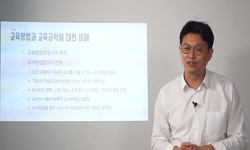This study deals with the case of online-based project learning, which was designed for the purpose of university educational innovation and enhancing learners’ competencies required by society, operated during the COVID-19 pandemic. The course was ...
http://chineseinput.net/에서 pinyin(병음)방식으로 중국어를 변환할 수 있습니다.
변환된 중국어를 복사하여 사용하시면 됩니다.
- 中文 을 입력하시려면 zhongwen을 입력하시고 space를누르시면됩니다.
- 北京 을 입력하시려면 beijing을 입력하시고 space를 누르시면 됩니다.

파이썬을 활용한 온라인 기반 프로젝트의 집중학기제 운영사례 : S 여대를 중심으로 = A Case Study on the Intensive Semester Operation of Online-based Project Learning Using Python : Focusing on S Women’s University
한글로보기https://www.riss.kr/link?id=A107875991
- 저자
- 발행기관
- 학술지명
- 권호사항
-
발행연도
2021
-
작성언어
-
- 주제어
-
KDC
530
-
등재정보
KCI등재
-
자료형태
학술저널
-
수록면
3-14(12쪽)
-
KCI 피인용횟수
0
- DOI식별코드
- 제공처
-
0
상세조회 -
0
다운로드
부가정보
다국어 초록 (Multilingual Abstract)
This study deals with the case of online-based project learning, which was designed for the purpose of university educational innovation and enhancing learners’ competencies required by society, operated during the COVID-19 pandemic. The course was applied Python programming language, team-based project learning, and intensive course system, which is required by our society and companies in the era of the 4th industrial revolution. Also it was operated as a non-face-to-face online class, which would have been operated in an offline class if it had not been for Covid 19 pandemic, to explore the possibilities and educational effects of online learning. To do this, 32 university students participated in online-based project learning during 8 weeks, and then conducted a survey. The survey results were analyzed in terms of i) non-face-to-face online learning, ii) team-based project learning, and iii) application of the intensive course system. Results say that most of the learners were satisfied with the online learning, team-based project learning, and the intensive semester system applied in this course at a high level, and also they clearly presented the reasons. Thereby, it has been confirmed that the learners were already well aware of the pros and cons of each learning method. Based on these results, the implications were discussed.
목차 (Table of Contents)
- I. 서 론 II. 이론적 배경 III. S여대의 파이썬을 활용한 온라인기반 프로젝트 집중학기제 운영 사례 IV. 결론 및 시사점 참고문헌
- I. 서 론 II. 이론적 배경 III. S여대의 파이썬을 활용한 온라인기반 프로젝트 집중학기제 운영 사례 IV. 결론 및 시사점 참고문헌
참고문헌 (Reference)
1 이성혜, "플립러닝 기반 공학수업 개선 방안 연구- 국내 C대학 공학수업 운영 사례를 중심으로 -" Korean Society for Engineering Education 22 (22): 3-15, 2019
2 노선숙, "프로젝트기반학습 입문서: 중등교사를 위한 기준중심 프로젝트기반학습 안내서" 교육과학사 2007
3 남창우, "포스트 코로나 공학교육에 대한 소고(小考)포스트 코로나 교육의 대전환을 위한 공학교육의 중단기적 계획" 27 (27): 31-33, 2020
4 교육부, "창의혁신인재 양성을 위한 대학 학사제도 개선방안" 교육부 2016
5 김근곤, "전공 간 협력 프로젝트 학습이 대학생의 의사소통, 문제해결, 자기주도적 학습능력에 미치는 효과" 한국간호교육학회 14 (14): 252-261, 2008
6 유지원, "대학생의 팀 기반 프로젝트 학습에서 학습성과에 대한 협력적 자기효능감, 팀 효능감, 팀 상호작용 간 관계" 학습자중심교과교육학회 14 (14): 89-110, 2014
7 임지영, "공학교육에서 교수 으뜸원리를 적용한 플립러닝 모델 및 교수전략에 관한 연구" 한국공학교육학회 22 (22): 39-47, 2019
8 이영미, "공과대학 팀 기반 프로젝트 학습 관련 요인 탐색" 학습자중심교과교육학회 13 (13): 351-375, 2013
9 한지영, "‘창의적문제해결방법론’ 교과목의 플립러닝 수업 설계에 관한연구" 한국공학교육학회 22 (22): 22-28, 2019
10 Almaguer, I., "Project-based learning : Innovative pedagogy for 21st-century english learners" 28 (28): 177-190, 2015
1 이성혜, "플립러닝 기반 공학수업 개선 방안 연구- 국내 C대학 공학수업 운영 사례를 중심으로 -" Korean Society for Engineering Education 22 (22): 3-15, 2019
2 노선숙, "프로젝트기반학습 입문서: 중등교사를 위한 기준중심 프로젝트기반학습 안내서" 교육과학사 2007
3 남창우, "포스트 코로나 공학교육에 대한 소고(小考)포스트 코로나 교육의 대전환을 위한 공학교육의 중단기적 계획" 27 (27): 31-33, 2020
4 교육부, "창의혁신인재 양성을 위한 대학 학사제도 개선방안" 교육부 2016
5 김근곤, "전공 간 협력 프로젝트 학습이 대학생의 의사소통, 문제해결, 자기주도적 학습능력에 미치는 효과" 한국간호교육학회 14 (14): 252-261, 2008
6 유지원, "대학생의 팀 기반 프로젝트 학습에서 학습성과에 대한 협력적 자기효능감, 팀 효능감, 팀 상호작용 간 관계" 학습자중심교과교육학회 14 (14): 89-110, 2014
7 임지영, "공학교육에서 교수 으뜸원리를 적용한 플립러닝 모델 및 교수전략에 관한 연구" 한국공학교육학회 22 (22): 39-47, 2019
8 이영미, "공과대학 팀 기반 프로젝트 학습 관련 요인 탐색" 학습자중심교과교육학회 13 (13): 351-375, 2013
9 한지영, "‘창의적문제해결방법론’ 교과목의 플립러닝 수업 설계에 관한연구" 한국공학교육학회 22 (22): 22-28, 2019
10 Almaguer, I., "Project-based learning : Innovative pedagogy for 21st-century english learners" 28 (28): 177-190, 2015
11 Dhawn, S., "Online learning : A panacea in the time of COVID-19 crisis" 49 (49): 5-22, 2020
12 Yu, J., "Is online learning the future of education?"
13 Thomas, J. W., "A review of research on project-based learning"
14 권선아, "4차 산업혁명기반 지능정보사회에서의 원격고등평생교육 미래 구상" 한국방송통신대학교 원격교육연구소 2018
동일학술지(권/호) 다른 논문
-
창의공학설계 및 실습 수업을 위한 아두이노 기반 교육용 캔위성 개발 연구
- 한국공학교육학회
- 이영건(Lee, Younggun)
- 2021
- KCI등재
-
공과대학 비대면 온라인 수업의 교수자 평가와 경험 분석
- 한국공학교육학회
- 이현경(Lee, HyunKyung)
- 2021
- KCI등재
-
- 한국공학교육학회
- 신태섭(Shin, Tae Seob)
- 2021
- KCI등재
-
이공계 진로교육 프로그램이 과학영재 고등학생의 진로결정자기효능감, 진로결과기대, 그릿에 미치는 영향
- 한국공학교육학회
- 최진수(Choi, Jinsu)
- 2021
- KCI등재
분석정보
인용정보 인용지수 설명보기
학술지 이력
| 연월일 | 이력구분 | 이력상세 | 등재구분 |
|---|---|---|---|
| 2022 | 평가예정 | 재인증평가 신청대상 (재인증) | |
| 2019-01-01 | 평가 | 등재학술지 유지 (계속평가) |  |
| 2016-01-01 | 평가 | 등재학술지 유지 (계속평가) |  |
| 2012-01-01 | 평가 | 등재학술지 유지 (등재유지) |  |
| 2009-01-01 | 평가 | 등재학술지 선정 (등재후보2차) |  |
| 2008-01-01 | 평가 | 등재후보 1차 PASS (등재후보1차) |  |
| 2006-07-21 | 학회명변경 | 한글명 : 한국공학교육기술학회 -> 한국공학교육학회영문명 : Korean Society For Engineering Education & Technology Transfer -> Korean Society for Engineering Education |  |
| 2006-01-01 | 평가 | 등재후보학술지 선정 (신규평가) |  |
학술지 인용정보
| 기준연도 | WOS-KCI 통합IF(2년) | KCIF(2년) | KCIF(3년) |
|---|---|---|---|
| 2016 | 1.01 | 1.01 | 1.06 |
| KCIF(4년) | KCIF(5년) | 중심성지수(3년) | 즉시성지수 |
| 0.85 | 0.88 | 1.334 | 0.31 |




 ScienceON
ScienceON 스콜라
스콜라






